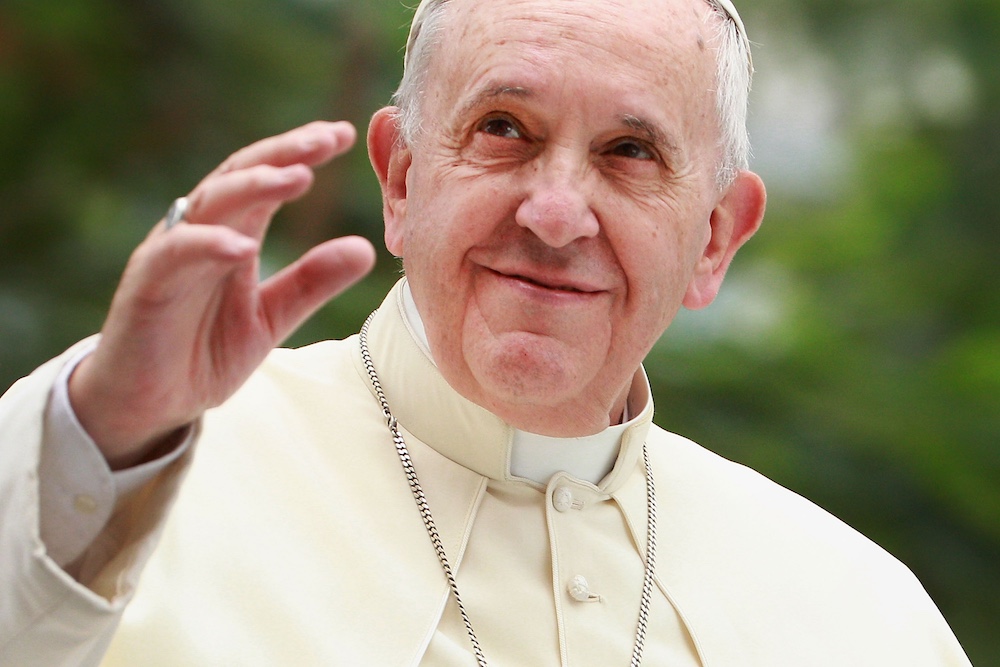Pope Francis died as he had lived. His last action was to join the crowd as they celebrated the rising of Jesus from the dead at Easter. Having preached the Gospel of hope and life in hard times through his life he left it to us whom he had inspired to carry it on.
 In a world that sees refugees and immigrants as a threat, disregards the victims of war, trashes the environment, rewards self-interest and cheapens religious faith, he wept with those mistreated, pleaded their cause and radiated joy and hope. He faced all the things that make for gloom, did what he could to change them, reached out to those who suffered and caused them, and remained full of hope. There will come a time to reflect on his work. Now it is more decent to treasure and grieve him.
In a world that sees refugees and immigrants as a threat, disregards the victims of war, trashes the environment, rewards self-interest and cheapens religious faith, he wept with those mistreated, pleaded their cause and radiated joy and hope. He faced all the things that make for gloom, did what he could to change them, reached out to those who suffered and caused them, and remained full of hope. There will come a time to reflect on his work. Now it is more decent to treasure and grieve him.
I was first struck by how ordinary Pope Francis is. From the beginning he was one of us. He went down the street to the barber, rushed off to Lampedusa to grieve with refugees after drowning, left the popemobile to console a grieving woman, spoke off the cuff at press conferences, and at his first Easter as Pope washed the feet of a young Muslim woman with tats. His language was earthy too, describing the Church as a field hospital, and telling priests that they are shepherds who should stink like sheep.
He also bought into the huge issues that face the world and Catholic Church. He wrote letters to the world about responding to climate change, pressed to end wars and to welcome refugees. Within the Catholic Church he asked us to go out to people at the edge of the Church and society. He tried to build a Church order based in reflection, conversation and responsibility from the grass roots to Rome. Through this he wanted us all to be what he had been: sisters and brothers of all we met, sharing their way of life, their enthusiasm and their frailties. And he nailed it down as the future of the Church.
Pope Francis often puzzled people by taking seriously the living faith of the Church while taking liberty with traditions. He showed little respect for advice to do things as they had been done from time immemorial. He was not fussed at being misinterpreted or having to correct himself. Some of us found this refreshing. Those who longed for a Church in which nothing changed did not approve of it.
At the heart of Pope Francis’ actions lay his personal faith. It was perhaps best articulated in the motto he chose as Pope: miserando et eligendo. The quotation speaks of a God who has mercy on us as sinners and chooses us as friends in his service. Familiarity can make these words sound everyday. When they shape a person’s life, however, they can be freeing and life changing. They certainly lay at the heart of Pope Francis’ faith and way of living. They made him bold: he made no claim to virtue and reputation that needed to be defended. Neither did he see his election as Pope to be a burden that he needed to live up to.
Fo us Jesuits he was our companero, a fellow sinner gifted and called by God. He could also shame us by living as we are called to live. He was free to acknowledge his mistakes without fuss and did not fear failure. The future lay in God’s hands. He could also mix with simple people and disreputable people without fear of stain and find delight and compassion in the encounter.
Jorge Bergoglio saw himself as an unprofitable and joyful servant. His dying on Easter Monday seemed appropriate. He had followed Jesus and shared with others the way of the Cross. He had also shared the buoyant hope of life with the risen Jesus. And having done that he left us without fuss to live boldly as he did.
Photo by Lisa Maree Williams/Getty Images
Andrew Hamilton is consulting editor of Eureka Street, and writer at Jesuit Social Services.